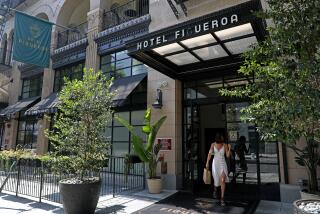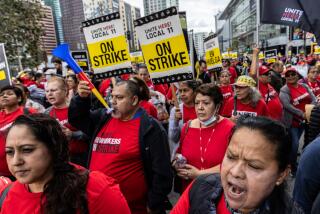Philippine Revolt Ends as Marcos Backers Flee Hotel
- Share via
MANILA — A 38-hour siege of hundreds of civilians and soldiers loyal to deposed Philippine President Ferdinand E. Marcos ended with dazed stares and few tears at dawn today, as the soldiers sneaked out the Manila Hotel’s back door and the civilians scampered out the front.
The would-be rebels left unmolested, and they unceremoniously dispersed into the streets of Manila. Soldiers and riot troops loyal to President Corazon Aquino entered the hotel and immediately began what one officer described as a “sanitation operation”--searching each of the hotel’s more than 500 rooms for booby traps or pro-Marcos stragglers.
The Marcos loyalists also left behind so much filth and trash on the palatial hotel’s Florentine marble floors, mirrored walls and hardwood furniture that hotel officials said it will take 48 hours to make the building ready for guests, nearly 300 of whom were evacuated when the siege began late Sunday afternoon.
The end of the hotel’s occupation came at 4:30 a.m. today when Oliver Lozano, head of Loyalists for Marcos, gathered the demonstrators in the empty driveway of the hotel and told them in a quiet voice, “The loyalists know how to bow in order to conquer. . . . We will leave this hotel together.”
But when the end came, none of the political leaders who had guided the largely rural and unsophisticated Marcos supporters into the hotel Sunday were around. They had left the hotel nearly 12 hours earlier.
Little Public Support
The political and military leaders who launched the occupation had agreed Monday to surrender the government-owned hotel at sunrise today, after it had become clear that their attempt to use it as a logistical headquarters to seize the government from President Aquino had failed to win substantial support from the Philippine nation.
The agreement came after two hours of negotiations between Deputy Defense Minister Rafael Ileto and veteran politician Arturo Tolentino, Marcos’ 75-year-old former running mate, who had initiated the rebellion by having himself sworn in as acting president on the hotel driveway Sunday afternoon.
Emerging hot and haggard from the negotiations Monday night, Tolentino said “there is a consensus” among the pro-Marcos leaders to voluntarily give up the hotel. But none of the leaders returned to the besieged hotel after the negotiations.
‘I Will Never Renounce’
Despite the agreement, Tolentino insisted that he is still the acting president, a position, he said, “I will never renounce.” But he no longer claimed that the Manila Hotel is his seat of government.
At another hotel nearby, Aquino’s defense minister, Juan Ponce Enrile, told a meeting of the Rotary Club on Monday night that the rebellious soldiers had been told that if they gave up before 3 p.m. today, “there would be no prosecutions, no charges. We will consider the matter as if nothing happened.”
Asked why he would be so lenient with rebellious soldiers, he replied, “We want to be sure that we do not fragment the military organization.”
Enrile himself fractured the military last February when he and Gen. Fidel V. Ramos, since appointed by Aquino as armed forces chief of staff, led a civilian-backed coup that drove Marcos into exile in Hawaii.
Show of Force
Enrile’s offer had been backed up by a show of force, however. A half-dozen armored personnel carriers were positioned in a park opposite the hotel. Hundreds of helmeted riot troops with metal shields and rifles barricaded the roads to keep other Marcos loyalists from reaching the hotel. And the defense minister did add a threat to his olive branch Monday night.
“Next time around, we will not be lenient,” he told a public gathering at the hotel. “If they want to be spoiled brats, they will feel the pinch.”
Enrile said the fate of Tolentino, whom President Aquino had said is guilty of sedition, would be up to the president and her justice minister.
In general, though, Enrile’s tone throughout Monday was lighthearted, a reflection of the fact that the abortive bid for national power had been confined to a tiny corner of Manila.
After a day in which the sprawling city’s schools, offices and entertainment houses showed no signs of crisis, Enrile insisted on keeping his scheduled speaking engagement before the Rotarians at the Manila Hilton, five blocks from the scene of the siege.
Strong Ultimatums
The negotiated settlement came within hours of strong ultimatums from both Aquino and Enrile, who issued separate statements at 3 p.m. Monday giving the Marcos loyalists 24 hours to surrender.
Calling their attempted countercoup “a sorry adventure,” a “foolhardy gesture” and “a forlorn cause,” Aquino flatly told the forces inside the hotel, “End it and come out within 24 hours.”
In the statement, read by Aquino to local and foreign reporters inside her guest house at the presidential palace complex Monday afternoon, the president said the rebellion was “confined to a small number” of civilians and soldiers who were “largely misguided by a disinformation campaign . . . engineered by Mr. Marcos.”
Aquino also added that “an early and favorable response” to her ultimatum “will be taken strongly into consideration,” but she quickly added, “an incident like this will not be allowed to happen again.” The Marcos loyalists and “other subversives” will be “closely monitored” in the future, she said.
Major Aquino Victory
Even before any of the hotel occupation force left the stained and litter-strewn grounds of the hotel compound, it was already clear that Aquino had won a major victory, perhaps the most important since she assumed power in the wake of Enrile’s Feb. 25 coup.
Not only had Enrile and the military establishment remained unwaveringly loyal, despite Tolentino’s attempts to recruit Enrile by offering him both the defense and prime ministerships in his shadow Cabinet, but Aquino also proved that she remains the most powerful political force in the country.
Enrile also emerges stronger from the conflict’s apparently bloodless resolution.
Publicly, he said the failed countercoup was a victory for the government as a whole. He told the Rotarians that “the incident will be perceived as a sign of strength of the government, that it could tackle any crisis. This government is not a pushover government.”
But senior Western diplomats and Filipino political analysts said the defense minister’s show of loyalty and of his control over a military still nursing wounds from the February coup also strengthened Enrile’s hand within the government.
Strengthens Communists
“The irony is, though, that any event seen as strengthening the hand of the rightist faction of the government, Enrile’s faction, is also a victory for the Communists,” said a high-ranking European diplomat based in Manila. And Enrile himself tempered his triumph with a thinly veiled reference to the Communist insurgents who have been waging a bloody civil war against the government for 17 years.
“There are forces lurking in the shadows, waiting to exploit it,” Enrile declared.
Throughout the siege that transformed the Manila Hotel, with its marble, crystal and hardwood fittings, into a grimy provincial village, the political leaders of the occupation contended that their primary concern was the spread of communism, their fear that Aquino’s government has invited the Communists to take over the nation by arranging cease-fire talks with the rebel leaders.
Clearly, though, they were counting on support from Enrile, whose recent hard-edged comments against the cease-fire negotiations had led many Marcos loyalists to believe that he was growing estranged from Aquino’s civilian Cabinet, several of whom are civil-rights lawyers who once represented accused Communist subversives.
Enrile, Not Tolentino
The original military force that helped Tolentino secure the hotel Sunday afternoon consisted of more than 300 heavily armed soldiers, many of whom insisted from the beginning of the drama that they were taking the action to show their support not for Tolentino, but for Enrile.
In the first 12 hours of the siege, though, after Enrile publicly proclaimed his loyalty to Aquino, 210 of those soldiers climbed back into their troop transports and returned to their base at Camp Olivas northwest of Manila.
And in a brief conversation with reporters Monday afternoon, the commander of those 210 infantrymen said they had had been deceived by the pro-Marcos military leaders from the start. When asked why his men had left their posts at the camp and driven to a civilian pro-Marcos rally in the park opposite the Manila Hotel, Lt.Col. Danilo Venturina replied, “Just to protect Minister Enrile.”
Enrile himself declared in his speech Monday night: “Some of our men have been drawn to take sides with the group in the Manila Hotel with some sort of misrepresentation. But I am glad they are now with us.”
Venturina and his men were absolved of any guilt in the affair, Enrile said, and he pledged to follow a policy of restraint toward the other apparent deserters still inside the hotel--”so our men could find an honorable way out of their respective positions without embarrassment and especially without humiliation.”
More to Read
Sign up for Essential California
The most important California stories and recommendations in your inbox every morning.
You may occasionally receive promotional content from the Los Angeles Times.













